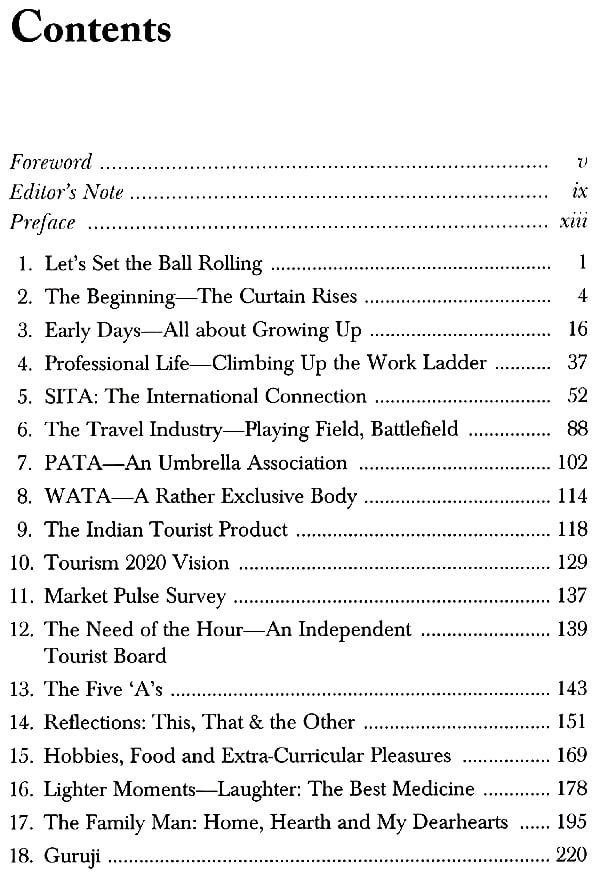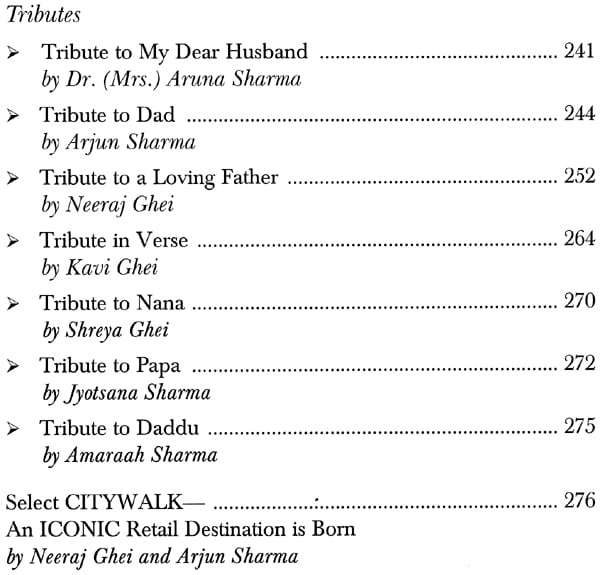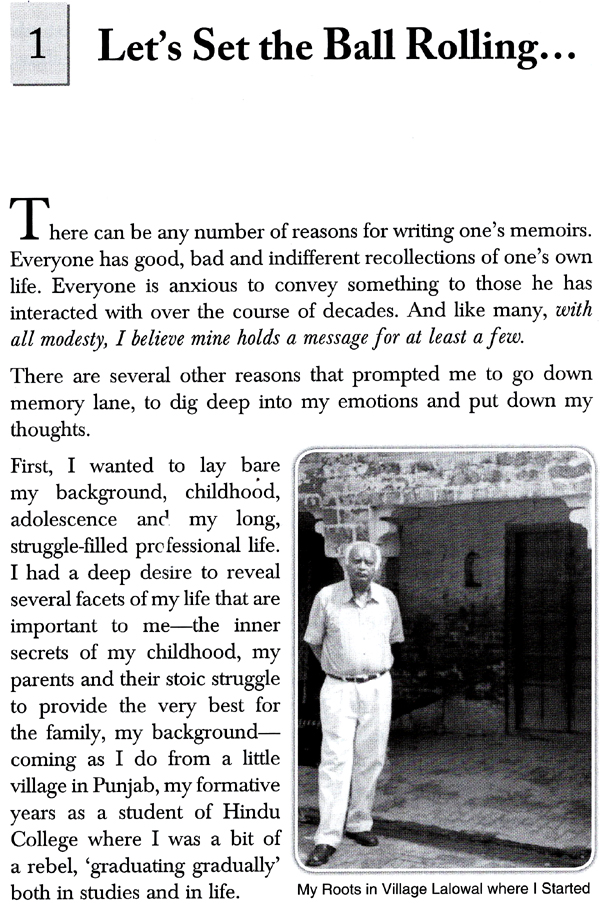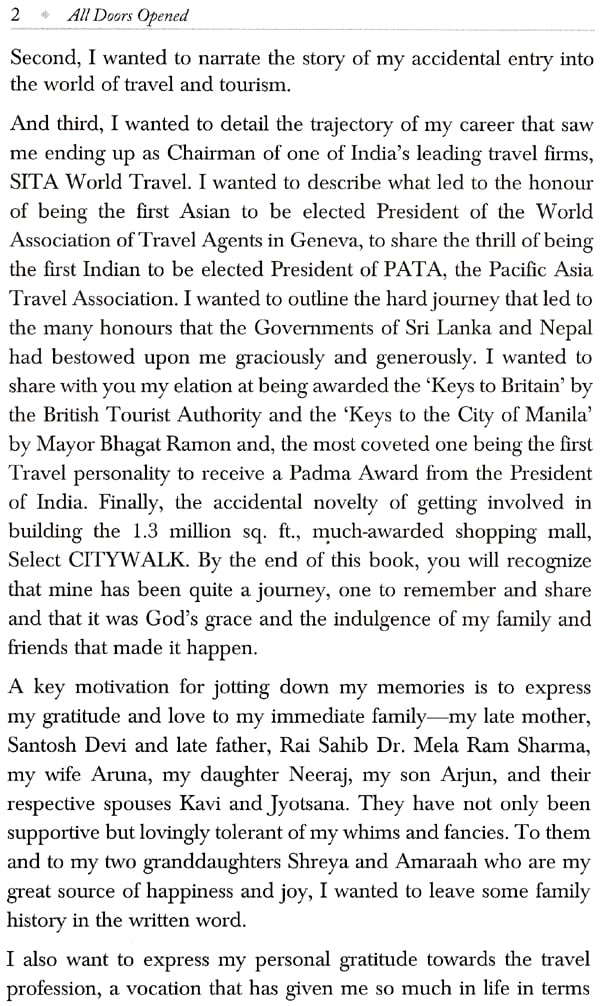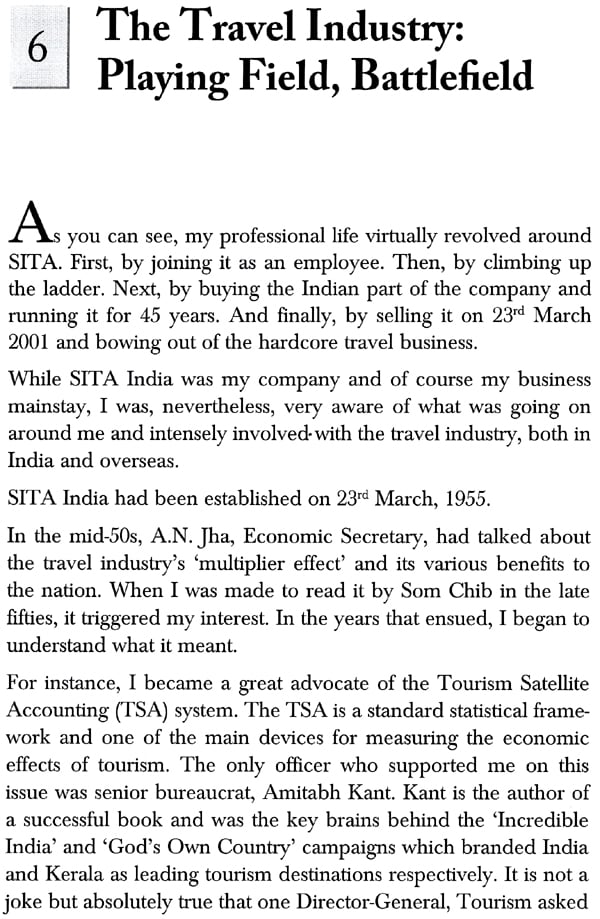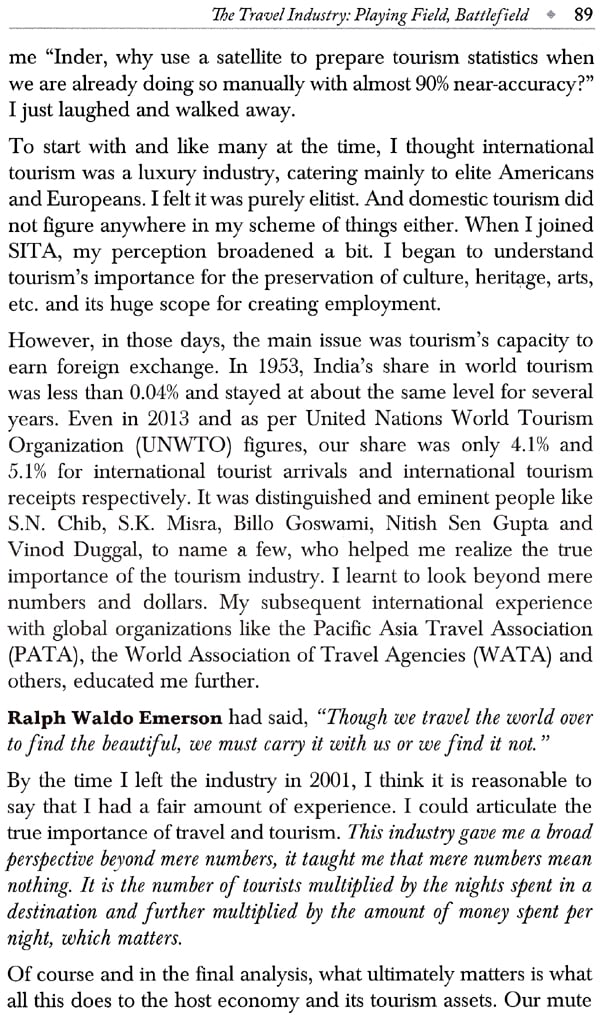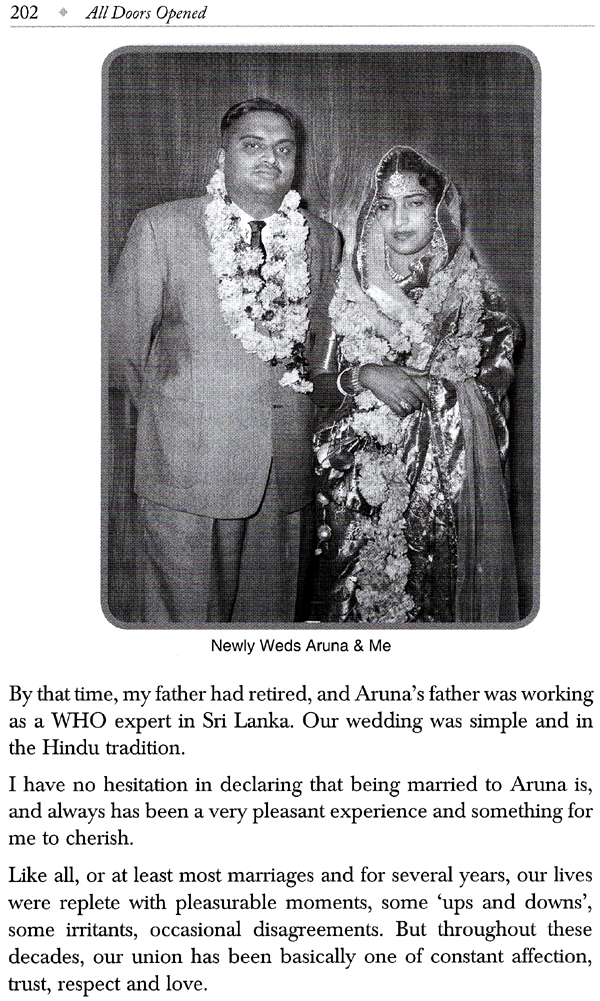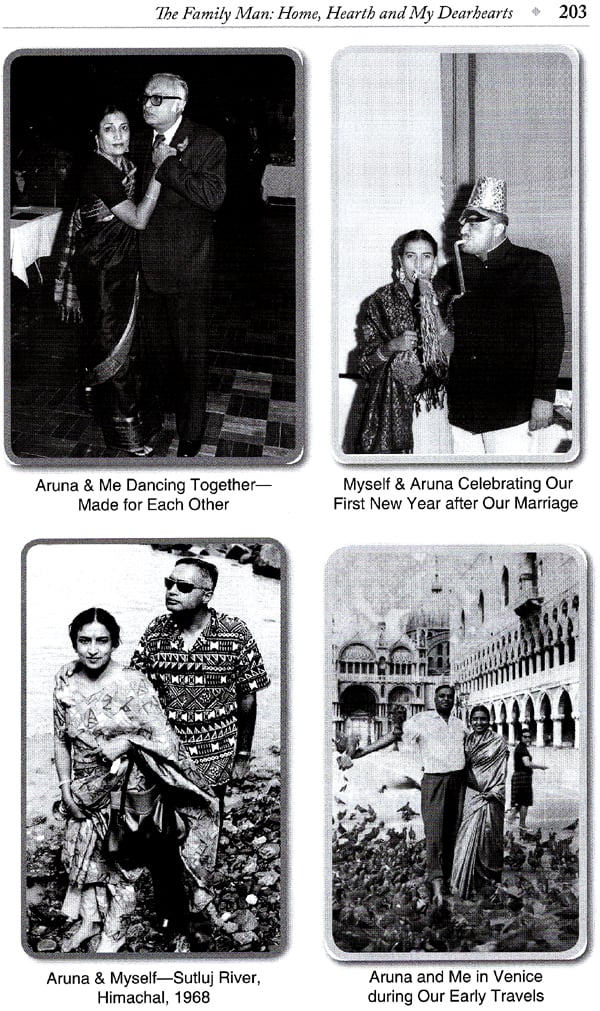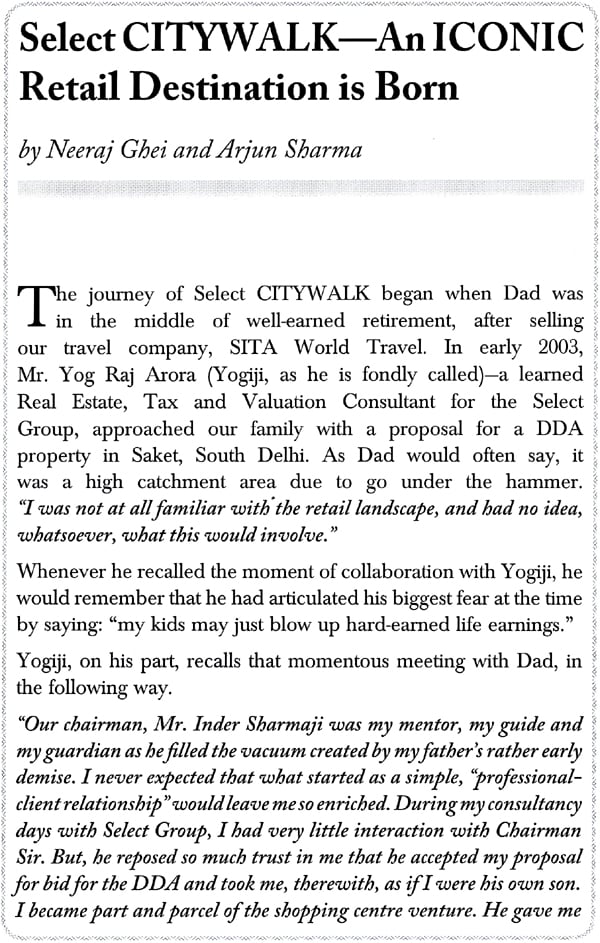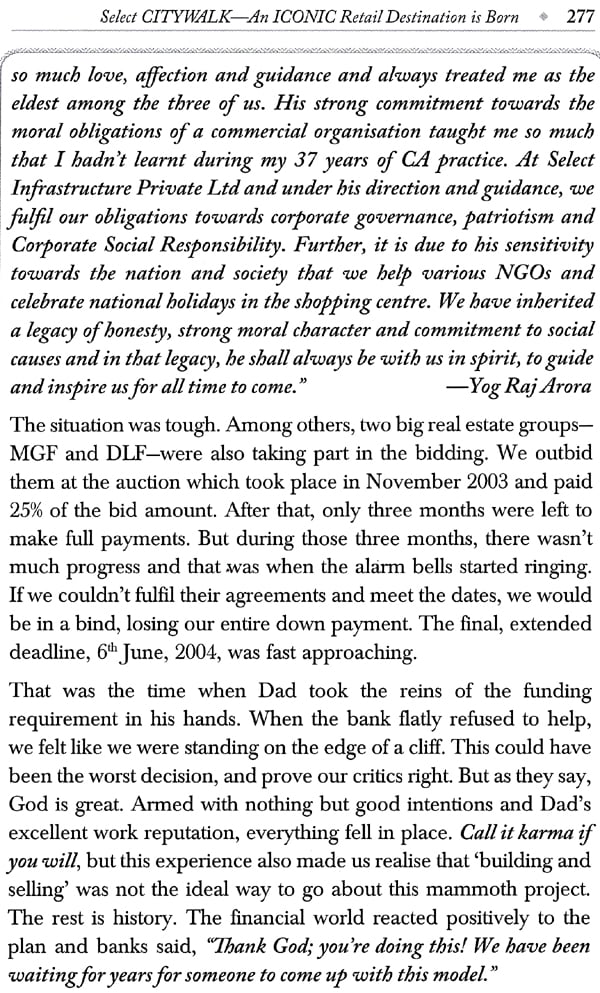
All Doors Opened (An Autobiography by Inder Sharma)
Book Specification
| Item Code: | NAR746 |
| Author: | Harbhajan Butalia and Meera Dua |
| Publisher: | Allied Publishers Pvt. Limited |
| Language: | English |
| Edition: | 2018 |
| ISBN: | 9789387997141 |
| Pages: | 324 (Throughout Color and B/W Illustrations) |
| Cover: | HARDCOVER |
| Other Details | 10.00 X 6.50 inch |
| Weight | 750 gm |
Book Description
"All Doors Opened" is hard to slot into any one particular genre of writing because it fits into so many of them. Essentially, it is the story of Inder Sharma, the canny creator of SITA World Travel India, the towering giant of India's travel industry and later the Chairman of India's most iconic and celebrated shopping centre, Select CITYWALK, as told in his own words. But it's much more than an autobiography.
Inder Sharma begins the scintillating trajectory of his life's journey in rural Punjab. There are moving passages of how poorer members of his family built their lives and careers with little or nothing to aid them, except the light of a streetlamp. There are hilarious chapters on the many stumbling blocks faced by the writer who, at a young age, was already an impatient visionary with big dreams for India and himself. There are amusing paragraphs that take the reader around the world on a roller-coaster ride. From seedy hotels in New York to eagle-eyed inspections of kitchens in Indian hospitality establishments, from pranks played at palaces in Rajasthan to haute cuisine in Paris: Inder Sharma proves himself an excellent raconteur of travel stories. There are kebab meals aboard trains, there are ice-cream cones and gallant courtship at the college-gate of his first and last love, his wife Aruna.
There is scholarly advice and invaluable direction for those who guide India's tourism industry today. Laced with gentle, self-depreciating humour and syffused with deep love for his family and friends, All Doors Opened offers the best instruction to young people embarking on their careers; in any profession and anywhere in the world. It is Inder Sharma's ode to hard work, family values, harmless mischief, acts of kindness and good times. But it's also a paean to life that will inspire and move readers to live it to the hilt, just like the author did. As per his last wishes, all proceeds will be donated to "Pandit Kanshi Ram and Pandit Kirpa Ram Charitable and Welfare Trust" which runs "Guruji's Dispensary" in his ancestral Village Lalowal in district Gurdaspur, Punjab.
Inder Sharma was born in Punjab and educated at Delhi University, where, he loved to say, he "graduated gradually". His career in the travel industry began as a transfer assistant for Mercury Travels. His natural talent for the industry that was so beloved to him, was quickly recognized and he rose to various managerial positions before joining SITA World Travel in New York. It was his sheer genius that enabled him to acquire SITA and successfully run India's then largest travel company and foreign exchange earner with a giant international presence for several decades. Inder Sharma was a respected luminary of the travel industry both in India and across the world. He was the President of the Travel Agents Association of India and of nearly all leading international gremiums on travel, like the Pacific Asia Travel Association (PATA). He was also the first Asian President of the World Association of Travel Agents headquartered in Geneva. He was the only travel agent to serve on the Board of Directors of Air India and the now defunct domestic carrier, Indian Airlines. He was a member of the Tourism Boards of several Indian states. Inder Sharma was actively involved with education related to tourism too. In 1990, Inder Sharma received one of India's highest civilian awards, the Padma Shri from the President of India for his contribution to tourism, making him the only person from the travel industry, to date, to be honoured thus. He was also honored by the governments of Nepal and Sri Lanka for promoting tourism to those countries. After the sale of SITA, Inder Sharma got involved in various charitable institutions. He also began to enjoy his grandchildren's company and retirement but -history was not done with him yet. He built and became the Chairman of Select CITYWALK, which, since 2007, has won the award of 'Best Mall in India' every year. Inder Sharma also kept up his 'Coffee Club' meetings at the Imperial Hotel with his friends right up to his demise in 2017. And the one thing he took the greatest pride in is to hoist the national flag at the mall, year after year, to commemorate India's brave soldiers who had laid down their lives in the Kargil war. His career was meteoric, his personality both gentle and mercurial and to those in his beloved travel trade, he was simply a genius.
On March 23, 2000, I sold SITA World Travel, one of India's leading travel agencies, to Kuoni, an international travel conglomerate with offices and collaborations all over the world. For someone whose starting salary was one hundred and fifty rupees per month, I sold SITA for a princely amount. At the time of sale, SITA had 28 branches in the country, nine representations overseas, joint collaborations in three SAARC countries namely Sri Lanka, Nepal and Bhutan and staff strength of over 800.
So who am I and why did I do this-the largest sale of a Travel Agency.
Let me introduce myself. I am Inder Sharma.
Someone who was a rather poor student and as I like to put it, someone who graduated gradually. Someone who spent eight years at Delhi University's Hindu College for his final degree: a Master's in Economics. Someone, who never attended a management institute but was yet able to anticipate the changing dynamics of India's travel industry, both internationally and locally,. Someone who started his career in 1953 as a Transfer Assistant, a job which was at a monthly salary of Rupees 150/-, just one notch higher than that of a peon; someone, who worked hard: first to convert SITA India from a branch of a wholly US-owned Company to an Indian one and finally end up owning the same in 1963.
Someone who was not only elected President of the Travel Agents Association of India (TAAI) for three terms but was also the first Asian to be elected for a six-year period as President of the World Association of Travel Agencies (WATA), which is headquartered in Geneva. And subsequently, someone who was the first Indian to be elected the President of the Pacific Asia Travel Association (PATA). Someone who was honoured by several countries for his contribution to Tourism and holds the "Key to City of Manila" and "Keys to Britain". Someone, who interacted with three most powerful ladies of the time: Margaret Thatcher, Prime Minister of England, Imelda Marcos, President of Philippines and Sirimavo Bandaranaike, Prime Minister of Sri Lanka.
Someone who was the first travel professional to receive the Padma Shri Award in 1990 for services to tourism and is, till date, the only travel agent to be honoured thus.
So why did all this happen? Perhaps all the other aspects of my life will hold some answers.
My parents belonged to poor families. My father, the late Rai Sahib, Dr. Mela Ram Sharma, did not have slippers to wear till he was in class IX. Till he joined the Veterinary College in Lahore, all he wore was a handed-down shirt and pyjama. He had been educated throughout on scholarships. A father, who gave his son the first sound and true management guru's mantra, one that I still follow: "When in doubt, treat others the way you would like to be treated."
I was never overly religious in my life. Whatever little religious education I received, was from my simple mother, the late Mrs. Santosh Devi. She had never enjoyed the formal higher education. She was religious, but not dogmatic. She taught me a second set of precious mantras. "Give away that which you most wish to receive," she told me. "Recognize the divinity of the Divine." This enabled me to recognize and worship the divinity of my Guruji.
Inder Sharma devoted his professional life to introducing India to the rest of the world. The many thousands-perhaps hundreds of thousands-of people who visited us as tourists under the guidance of the various companies and organizations with which he was associated, were given carefully-crafted experiences that enabled them to gain an understanding of Indian culture, history and life. They gained the confidence that they were in the capable hands of true professionals. In this way, he was India's Ambassador-at-Large to the world.
With this book, Inder has gone several steps further. He has given us-both Indians and others-a panoramic introduction to diverse aspects of Indian life: childhood in a very traditional Indian family, growing up as a student at Delhi University, settling down to a not-very-glamorous job at an entry level, and then using that as a springboard for unimaginable success. The great strengths of the classic Indian joint family become apparent, as one reads of how all family members are supported and how to triumph over inconveniences like hand-me-down clothes, a lack of money and of other material possessions.
In the same way, the parts of the book dealing with the writer's college days and immediate aftermath give readers an interesting (and for some of us, nostalgic) look at Koll-ata (then Calcutta) life in the 1950s. He describes the passion for political involvement of those years, with discreet, playful touches of romance embellishing the sidelines.
The roads that led from the village to the world, from a monthly salary of Rupees 150 to prosperity for the whole family, and from a carefree youth to a thoughtful spokesperson for an entire industry, are all charted with insight and humour. And the fact that all these roads were successfully traversed without any of the contemporary aids of the internet, smart phones, and instantaneous communication will be an eye-opener for the younger generation.
Inder and I shared the belief-not very widely acknowledged at the beginnings of our careers-that tourism was an extremely important industry, in terms of the potential for income and employment, as well as a crucial element of "soft power" in the world. When we first met, the relationship between the tourism industry and the concerned ministries and government agencies was, with a few notable exceptions, frosty, if not actually adversarial. As we advanced to more senior positions, Inder and I committed ourselves to changing this, and I think I can safely say that our joint efforts ushered in a new synergistic partnership between all parties involved.
I first came in contact with Inder in the early seventies at a conference in Shimla. And I must confess that our relationship did not start on a very positive note. Both of us were involved in tourism, but with different priorities. I was trying to put Haryana on the map through domestic tourism, and he was operating on the larger canvas. He agreed with the prevalent emphasis of the times on increasing the number of foreign tourists to India and thus earning more foreign exchange. I felt that equal emphasis needed to be placed on domestic tourism and on improving the infrastructure for that, to provide a solid basis for long-term integrated development of tourism in the country. Being young and quite ardent about our respective views, we clashed, with neither willing to give ground. In later years, it was characteristic of his generosity that he publicly acknowledged coming around to my view and that the domestic sector had to be given equal, if not greater importance. In his book, he has, over and over again, reiterated this view.
**Contents and Sample Pages**
